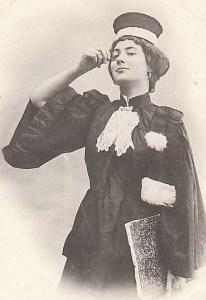I am now depicted as a former good-guy lawyer, i.e., a “First Amendment lawyer,” who lost his halo, fell in with bad company…and…revealed his lack of wit by ignoring the Free Speech Mafia and suing an Internet saint. - Charles Carreon
One of the most rewarding results of my increasing internet presence has been the opportunity to make the acquaintance of other well-known bloggers and public figures who use their platforms to fight for what they believe in; had I realized there were so many I would’ve started blogging back in the autumn of 2004, when I first really began to explore the whole internet thing beyond the confines of a few commercial and informational websites. But despite my tardy arrival, I’ve been accepted into the community of those who care enough about human rights to devote considerable amounts of their own (uncompensated) time to the struggle, and to my great amazement and delight I have discovered that a larger fraction of them than I had previously imagined are lawyers.
 The observation that whores and lawyers have a great deal in common is not a new or especially clever one; we both charge for our time, care professionally about people we may not like very much personally, etc. Nor are lawyers themselves oblivious to the resemblance; in fact, I think a majority of those who have joked about it to me over the years were themselves lawyers. The similarity extends to the fact that both professions have their goodies and baddies, their ethical and fair practitioners and their sleazy rip-off artists, their honest professionals and their opportunists who view their respective trades as little more than a means of larceny. But I’m ashamed to say that until I started reading and corresponding with lawyers who care deeply about civil liberties, I believed them to be a very small minority; I still can’t make a credible estimate about what fraction of all lawyers they might represent, but I suspect it’s not dissimilar to the fraction of whores who are honest and competent. As one might expect, most of them are attracted to criminal defense, and for reasons that should be obvious many of those with whom I’ve had the most contact are especially interested in free speech and the other rights guaranteed in the United States by the First Amendment.
The observation that whores and lawyers have a great deal in common is not a new or especially clever one; we both charge for our time, care professionally about people we may not like very much personally, etc. Nor are lawyers themselves oblivious to the resemblance; in fact, I think a majority of those who have joked about it to me over the years were themselves lawyers. The similarity extends to the fact that both professions have their goodies and baddies, their ethical and fair practitioners and their sleazy rip-off artists, their honest professionals and their opportunists who view their respective trades as little more than a means of larceny. But I’m ashamed to say that until I started reading and corresponding with lawyers who care deeply about civil liberties, I believed them to be a very small minority; I still can’t make a credible estimate about what fraction of all lawyers they might represent, but I suspect it’s not dissimilar to the fraction of whores who are honest and competent. As one might expect, most of them are attracted to criminal defense, and for reasons that should be obvious many of those with whom I’ve had the most contact are especially interested in free speech and the other rights guaranteed in the United States by the First Amendment.
From the time I was old enough to understand what censorship was, I’ve considered it loathsome in the extreme; it’s bad enough that busybodies want to tell other people what they can do, but telling them what they can think or say crosses over the line from garden-variety control-freakishness to full-blown mental illness. At one time, would-be censors were merely a very vocal minority in the US, but in recent years they’ve become far more numerous and powerful, even to the point where many who could be expected to fight them (such as journalists) are instead joining them, effectively declaring themselves mental incompetents who need to be told by their “betters” what they should be allowed to see and hear. The most common excuse nowadays (beside the nebulous “national security”) is the imagined emotional fragility of women and children; we are repeatedly told that speech or images some people don’t like must be censored to “protect” their delicate psyches from discomfort.
But the more offensive something is, the more important that it be protected, even if we disagree with it ourselves; because this is counterintuitive to so many people nowadays, it’s vital that those of us who understand it work together to defeat any and all efforts to suppress speech. This makes us seem rather fanatical to some, while others whose attempts at censorship are vigorously opposed may go as far as to cast us as members of some sinister cabal (in the exact same way prohibitionists malign sex worker activists by pretending we’re members of an imaginary “pimp lobby”). Hence today’s title, thoughtfully provided by Charles Carreon (whose attempts to censor every critic of his attempts to censor a popular cartoonist are already the stuff of legend). Carreon represented a website who tried to use a creative (that’s a nice way of saying “assholy”) interpretation of trademark law to censor said cartoonist (Matthew Inman, AKA “The Oatmeal”) and make a profit in the bargain, but was defeated (that’s a nice way of saying “buried”) by said “Free Speech Mafia”, who represented Inman pro bono (that’s a legal way of saying “for free”).
 Nor was this an isolated case; the blog Popehat has a regular feature called “The Popehat Signal”, by which it asks for pro bono help for bloggers and other worthy individuals threatened by such lawsuits (and as far as I know always gets it). Furthermore, I have been personally involved with seeking such help from this so-called “Mafia” on two separate occasions. In one, a popular sex worker rights podcast was threatened by a mainstream media corporation; I explained the problem to attorney Marc Randazza of The Legal Satyricon, and he was able to quickly smooth things over at no cost to the activists. In the other, I myself was threatened by a certain large internet-based corporation I’ve written very disparagingly about in this blog on several occasions; I turned immediately to Kenneth White of Popehat, who took care of things so expeditiously I didn’t even have time to get worried (again, at no cost to me). These men and women (and many others in the First Amendment Lawyers Association) don’t spend their time fighting censorship for the glory, and it certainly isn’t for the money; they do it for the same reason so many other activists fight attempts to infringe individual liberties, namely because it’s the right thing to do. And if that makes them some kind of gangsters, you can consider me a moll.
Nor was this an isolated case; the blog Popehat has a regular feature called “The Popehat Signal”, by which it asks for pro bono help for bloggers and other worthy individuals threatened by such lawsuits (and as far as I know always gets it). Furthermore, I have been personally involved with seeking such help from this so-called “Mafia” on two separate occasions. In one, a popular sex worker rights podcast was threatened by a mainstream media corporation; I explained the problem to attorney Marc Randazza of The Legal Satyricon, and he was able to quickly smooth things over at no cost to the activists. In the other, I myself was threatened by a certain large internet-based corporation I’ve written very disparagingly about in this blog on several occasions; I turned immediately to Kenneth White of Popehat, who took care of things so expeditiously I didn’t even have time to get worried (again, at no cost to me). These men and women (and many others in the First Amendment Lawyers Association) don’t spend their time fighting censorship for the glory, and it certainly isn’t for the money; they do it for the same reason so many other activists fight attempts to infringe individual liberties, namely because it’s the right thing to do. And if that makes them some kind of gangsters, you can consider me a moll.
